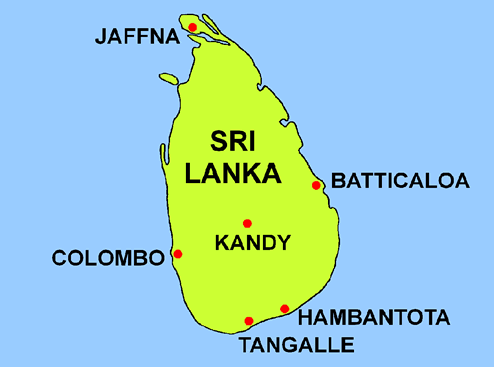'Undeclared' Jaffna War Taking Toll
by Seth Meixner, AFP, July 2, 2006
|
Uthayan editor Mr Kanamylnathan said the political uncertainty gripping the rest of the island has become a human rights crisis in Jaffna. "People can't lead a normal life. There is no peace of mind, no peace of body," he said. "There is always a sense of fear, who's going to come in the night, call you out of your house and shoot."
|
ROADSIDE killings and night-time knocks on the door have replaced mortars and suicide bombs as the new terror in this northern Sri Lankan city.
And it is increasingly the residents here who suffer, many say, as the government and Tamil separatist groups carry out a vicious "undeclared war" that targets civilians more than it does guerrillas or soldiers.
"Anything can happen at any time," M. V. Kanamylnathan, chief editor of the Tamil-language newspaper Uthayan said from his offices.
"It is like a volcano, people go about their daily lives and it is unseen but it can erupt at any time to do as much damage as possible," he said.
Just two months ago gunmen stormed the Uthayan building, killing two and wounding several others in an attack that has yet to be accounted for.
With the national truce unravelling amid daily violence and peace monitors virtually crippled by Tamil Tiger demands to lessen their presence, Sri Lanka is again veering dangerously close to open warfare.
Since December 825 people have died in military operations or tit-for-tat killings across the island in a surge of violence.
 But the killings and disappearances in Jaffna, a spit of government-controlled land in the country's northern tip that is cut off from the rest of the island by a vast swathe of territory controlled by the Liberation Tigers of Tamil Eelam (LTTE) -- already amount to war. But the killings and disappearances in Jaffna, a spit of government-controlled land in the country's northern tip that is cut off from the rest of the island by a vast swathe of territory controlled by the Liberation Tigers of Tamil Eelam (LTTE) -- already amount to war.
"There is an undeclared war. The (2002 ceasefire agreement) is there, but what happens all the time is this side or that side does something and the people are caught in the middle," Mr Kanamylnathan said.
Life continues, the streets are crowded with traffic and the shops around the bus station do a brisk trade in everything from dried food to household goods.
But heavily-armed army bunkers commandeer almost every street corner. Even before night falls the streets empty in Jaffna, where scars of a turbulent past are evident in the bullet-pocked walls and bombed-out buildings that blight nearly every neighbourhood.
"Even with no recent incidents, people are still living with a lot of tension," said 65-year-old shop worker Arumuganathan, who was buying a paper at a newsstand before hurrying home.
"Every time something happens, the LTTE blames the government and the government blames the LTTE. Because of this the civilians are the victims," he said.
"We've been expecting peace for the last 20, 30 years, but it is not coming. The people are wondering what's going to happen next," he said.
That question has been left largely unanswered by Nordic peace monitors whose crisis talks Thursday failed to map out their future on the island.
The Tigers have demanded that monitors from European Union members Finland, Sweden and Denmark quit, in a further blow to the faltering ceasefire.
"Before, people had confidence in the ceasefire but right now they are very sceptical," said a Catholic priest who did not want to be named.
"It may seem like things are normal, but the situation is not normal. Every day incidents are happening, someone is shot or kidnapped. The people are scared," he said.
Uthayan editor Mr Kanamylnathan said the political uncertainty gripping the rest of the island has become a human rights crisis in Jaffna.
"People can't lead a normal life. There is no peace of mind, no peace of body," he said.
"There is always a sense of fear, who's going to come in the night, call you out of your house and shoot."
|  Home
Home Archives
Archives Home
Home Archives
Archives